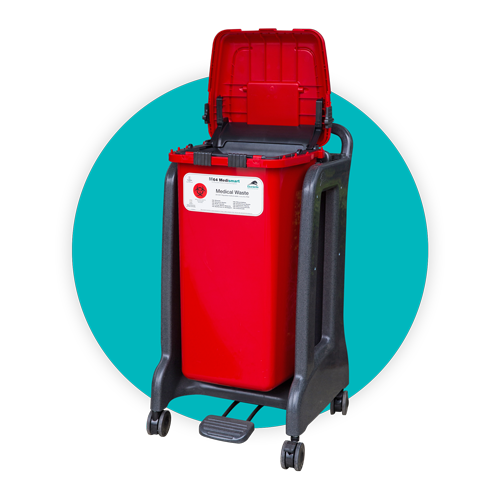How To Create a Compliant and Safe Medical Waste Program at Your General Practice

Treating patients is the first and foremost goal of every general practice. But responsible waste disposal should never be just an afterthought. Poor medical waste management strategies lead to increased costs, risk to staff and patients, and possible fines. Additionally, it can cause legal issues deriving from non-compliance to applicable laws. Whether your practice is just starting out or is an established office, every general practice should plan ahead to form waste disposal procedures that prioritize safety and compliance. Read on for further steps you can take to improve your clinic’s methods of dealing with medical waste.
TOPICS WE WILL COVER:
1 / Learn the Applicable Regulations
2 / Choose a Waste Management Partner
3 / Select Well-Designed Disposal Containers
4 / Implement and Adjust Your Waste Plan
Learn the Applicable Regulations

The best first step is becoming familiar with the relevant regulations governing the disposal of various types of medical waste. These regulations will form the backbone of any good compliance policy. Medical waste is regulated by a variety of federal agencies depending on its precise makeup. However, the most common federal agencies general practitioners are likely to be concerned with include the Centers for Disease Control, Environmental Protection Agency (EPA), Occupational Safety and Health Administration, US Food and Drug Administration, and the Drug Enforcement Administration. .
Federal regulations such as the Resource Conservation and Recovery Act (RCRA), which is enforced by the EPA, can result in fines of up to $87,855 per violation per day. This can be a devastating amount and clearly illustrates the importance of gaining a clear understanding of the relevant regulations for disposing of medical waste.
State and local laws affecting medical waste disposal procedures may vary strongly from area to area. But they are no less important to understand. Therefore, it is wise to consult an authority in local laws or waste disposal procedures to confirm what regulations apply. Once you are familiar with the appropriate rules for waste disposal – federal, state, and local – you can develop a plan that accommodates these regulations fully.
Choose a Waste Management Partner
The easiest way to keep abreast of relevant regulations and optimize your waste disposal strategy is to turn to a company that specializes in waste management from creation to final elimination. A waste disposal partner like Daniels Health goes above and beyond simply dropping off and picking up containers. Daniels works with your facility to identify inefficiencies and danger points and customize waste disposal solutions to the exact needs of your practice.
Daniels Health also provides educational modules and training for your staff to ensure containers are used correctly, and non-compliance is avoided. Daniels can also look at the volume and waste types generated to recommend the most ideal and cost-saving products. Make sure your waste provider offers many resources regarding compliance, safety, and proper usage. These resources help facilities make the most of their waste disposal products. From waste stream to workflow, this partnership helps providers integrate waste disposal into the daily habits of the clinic as smoothly and efficiently as possible.
Select Well-Designed Disposal Containers

The heart of any strong waste disposal strategy is well-designed containers. Daniels Health offers a wide array of reusable containers. These containers are suited for all the many kinds of potentially hazardous waste created by general practice. From Medismart for regulated medical waste to Sharpsmart for sharps to Pharmasmart for medications, the containers are made to exceed compliance and safety standards. They can prevent injury and cross-contamination with tamper-proof design and clear color coding. The containers’ sturdy exteriors are preferable over other more risky, flimsy bag-based disposal systems. Therefore, injuries and exposure can be greatly reduced by the right container choices.
A great many practices create small waste quantities more suited for single-use disposable containers like buckets and smaller bins. Daniels Health also offers several lines of non-reusable containers. These work well for clinics with smaller waste streams that infrequently fill bins fully. Again, the designs are resistant to tampering, penetration, and misuse, with easy-to-follow instructions for disposal.
General practices that do create larger waste volumes will be well-served by investing in reusable waste systems that promise greater cost-savings and even improved environmental impact. Therefore, Daniels Health works with many of the same Group Purchasing Organizations (GPO) and Integrated Delivery Networks (IDN) that general practices often do – reach out to your GPO or IDN, if applicable, to see what your options are.
Implement and Adjust Your Waste Plan
Waste management is not a plan that can be made once and never looked back at. It is a strategy that must be practiced by all staff members every day. That is why it is essential to bring everyone up to date on the clinic’s procedures. Every member of the staff generates waste that must be disposed of properly. Even general waste has its own containers and shouldn’t be mixed with other types to minimize disposal costs and contamination risks. Thus, everyone should be equally educated on the different varieties of containers in the building, how they are used, and what, if any, precautions must be taken with them.
As the waste disposal strategy is implemented, new issues or roadblocks may come to light. Or, as time passes, the facility’s needs may change as new, increased, or decreased amounts of certain waste types are generated. The plan can and should be updated to reflect new developments. Disposable containers can be upgraded to reusable ones for greater cost efficiency and environmental stewardship. Specialized container types can be added for new waste varieties if the clinic grows and develops more needs. Regular reviews of the waste plan to confirm safety and compliance are being minded should be conducted.
Final Thoughts

Prevention is a much smarter choice than simply waiting for problems to arrive and treating them later. This applies just as much to waste management as it does to health. Thinking ahead by getting to know the relevant federal, state, and local rules for discarding various kinds of medical waste, partnering with a reliable waste disposal partner, choosing smartly-designed containers, and being ready to implement and adjust the waste plan will ensure your general practice maintains the highest standards of safety and compliance. Contact Daniels Health today to learn more about how we can help your general practice streamline and optimize its waste collection and disposal.
